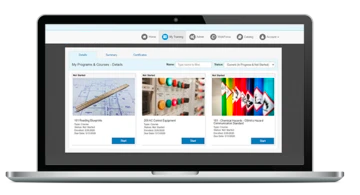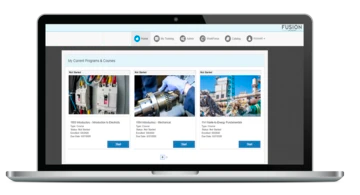This online maintenance management course covers how to use verbal and written communication tools, including the importance of listening. Explains how to motivate maintenance personnel through effective communication. Discusses how to organize written communication, best utilizing the elements of writing—parts of speech, phrases, clauses, sentences, structure, punctuation, and syntax. Gives examples of business writing used for reporting progress and motivating employees. This course has no prerequisites. Effective Communication for Supervisors is available in online maintenance training and course manual formats.
Lesson 1: Communication Objectives
Topics:
How communication works; Training new employees; Learning about your crew; Setting an example; Giving and receiving instructions; Motivating your crew; Using communication tools; Speaking on the telephone; Publishing in the company newsletter; Giving and taking interviews
Objectives:
– Explain how communication works.
– Explain how to use the various communication tools.
– Give examples of effective telephone use.
– Tell how to give and receive instructions effectively.
– Demonstrate effective interview techniques.
Lesson 2: Verbal and Nonverbal Communication
Topics:
Understanding the surrounding circumstances; Understanding the receiver’s background; Understanding nonverbal language; Working with language; Language growth; Building word awareness; Phrasing the message; Understanding varied meanings; Understanding other verbal clues; Understanding levels of language; Words for maintenance workers; Changes in workplace vocabulary
Objectives:
– Describe the importance of context in communication.
– Describe how a receiver’s background affects the message.
– Define and give examples of nonverbal language.
– Describe ways to improve vocabulary.
– Explain the importance of precise word choice.
Lesson 3: How to Listen
Topics:
Listening is important; What makes a poor listener; What good listening means; Head off trouble by listening; How to be a good listener; The importance of getting feedback; Asking questions and paraphrasing; How to be open to new ideas
Objectives:
– Tell how to be a good listener.
– Explain what makes a poor listener.
– Give techniques for identifying problems through good listening.
– Explain the importance of getting feedback.
– Show how to ask questions and paraphrase.
Lesson 4: Communication Maintenance
Topics:
What you need to be a supervisor; Oral communication skills; Making sure your instructions are clear; Handling bad news; Motivating your crew; Communication maintenance; How language is understood; Checking your language skills; Developing your vocabulary; Listening as a supervisory skill; Asking for feedback; Management vocabulary
Objectives:
– Give techniques for developing a management vocabulary.
– Tell how to check and maintain language skills.
– Show how to make sure instructions are clear.
– Explain how communication can motivate a crew.
– Give techniques for improving listening as a supervisory skill.
Lesson 5: Planning Your Writing
Topics:
Determining your purpose; Writing to inform; Persuasive writing; Knowing your audience; The audience’s effect on what you write; Point of view; Tone; Prewriting; Organizing your writing; Writing to motivate; Think before you write
Objectives:
– Tell how to determine the purpose for writing.
– Explain why it is crucial to know the audience.
– Give examples of a writer’s point of view.
– List techniques used in prewriting.
– Describe how to organize a written piece.
Lesson 6: The Mechanics of Writing
Topics:
Syntax; Syntactical Problems; Passive and Active Voice; Parallel Structure; Punctuation; Stoppers; Interrupters; Introducers; Commas
Objectives:
– Explain the importance of syntax.
– Compare the passive voice with the active voice.
– Recognize parallel structure.
– Identify the different types of punctuation.
– Give examples of comma usage.
Lesson 7: Business Writing
Topics:
Using Writing Effectively; Communicating with Email; Email Memos; How Emails are Planned; Email Memo Format; Letters; Letter Format; Reports; Report Format; Progress Reports; Recommendation Reports
Objectives:
– Give examples of memo, letter, and report format.
– Explain how to use and write a memo.
– Explain how to use and write a letter.
– Explain how to use and write a report.
↺ Back to Maintenance Supervisor Online Training Courses Courses





